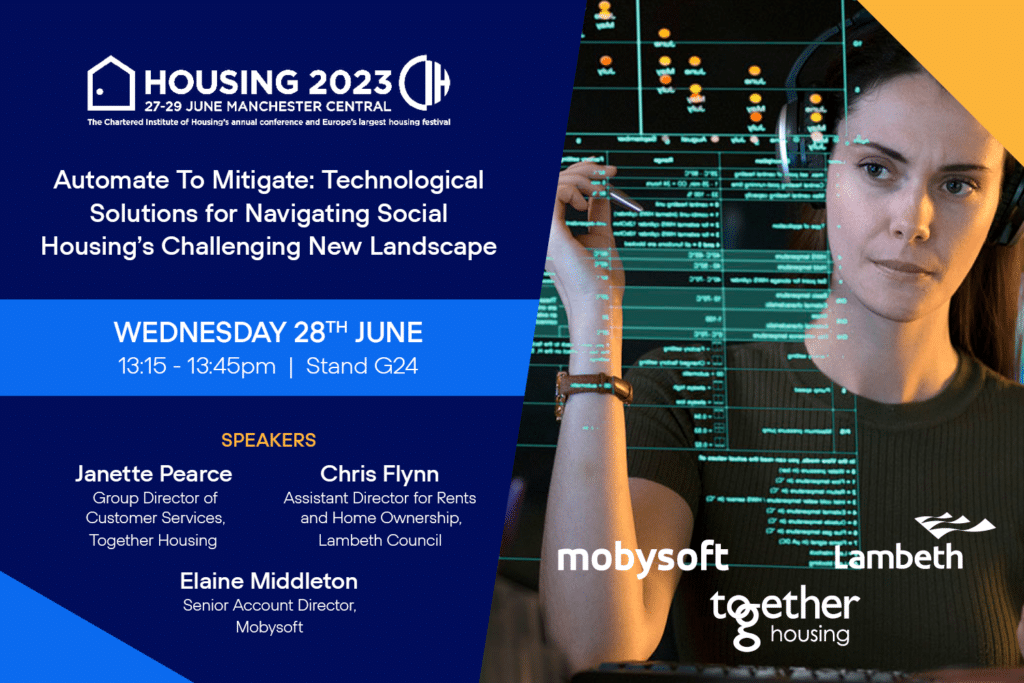Prediction & Projection: Automation within RentSense Driving Performance
We all know there are challenges in the social housing sector, with the lingering effects of the pandemic, ongoing cost of living crisis, rent caps and the staffing and retention crisis being endured by the sector all having an impact on the ability of social landlords to provide sustainable homes. In these challenging times, maintaining a sustainable tenancy lifecycle from initial placement, during the tenancy, and throughout to exit or change in dwelling is becoming increasingly difficult for social housing providers.
People often think in terms renting a house or flat but the reality is that tenants are actually renting a home, and this is an emotive process, perhaps more so than simply than renting a means to an end. Having somewhere to call your home is a basic human need. Taking this into account, you can recognise that one of the main goals for social landlords is to support tenants throughout this process or lifecycle and find the balance between receiving rent and in return ensuring homes are in good repair and healthily maintained. This is a difficult relationship to strike at the best of times for social landlords, and even more so when considering the current external market factors, the effects of which (and how they can be mitigated via adopting automation) we’re going to explore in this article.

Effects on Income Management
External economic factors affecting tenants’ ability to pay rent has led to challenges in income management for the sector, with different strategies being adopted by different landlords. These range from proactive early contact and financial advice to active management of arrears and ensuring former tenant debt is also a priority.
As I increasingly visit a variety of landlords and social housing providers I am struck by the different priorities and underpinning business processes each organisation has. There are variances in organisation types, incomes teams (specialist/generalist), size, structure, and geographical location to name but a few. This means that as a trusted analytics partner, Mobysoft must provide flexible solutions to support landlords that cater to different business outcomes. Our solutions allow precise near time actual predictions in arrears management and early intervention, as well as managing former tenant arrears and more complex solutions in the area of automation.

What Social Landlords Want from Automation
I often ask myself what does a landlord want from an automated solution? Is it a complete end to end solution that automates straightforward cases and runs regular campaigns, or a version that assists income officers and partially automates some of their day-to-day tasks? It’s also necessary to consider what the definition of performance is to these organisations? To different social housing providers this means different things and so the outcomes of the solutions must be considered when choosing the tools to achieve the performance goal.
Taking into account all these multifaceted objectives is a challenge to Mobysoft’s product, data and tech teams working on solutions in income management. However, as a company we have been developing solutions within the social housing sector for over 20 years and this means that we can call upon a large industry data set, diverse customer portfolio, and years of experience in supporting landlords through challenging circumstances. All our products are founded on precise predictions, based on the data we have (no augmentation thus far) and are therefore a fair and ethical analysis of tenant data where tenants can be assured that they are being treated without bias.

Improving Performance Through Automation
A way of improving performance can be through automation – the next natural step from recommended contact predictions. The question here is why an organisation would choose to automate? Usually there are two outcomes – either the goal is to encourage tenants to engage and contact income teams, or the strategy is to provide nudges to encourage tenants to self-serve. We know that being in debt may lead to feelings of embarrassment and a reluctance to seek help and so nudging a tenant to self-correct may be a more of a favourable approach.
The two outcomes outlined may seem to conflict with each other, but both can and should co-exist as they allow social landlords to cater for the differing needs of the tenant. Automation solutions in this context are fundamentally about sending the right message to the right person at the right time, and so having a range of tools to fit different situations is paramount.

The Future of Automation
Other automation solutions we are currently developing centre on effectively identifying tenants at risk of falling into arrears before it happens. The data teams here at Mobysoft are designing models using machine learning to identify payment patterns and provide insights so organisations can act to this early signal that a tenant is at risk of falling into arrears. The automated message/nudge element serves as reminder to the tenant of upcoming due payments but also encourages engagement with their housing provider’s support teams to seek financial advice in the event they are struggling financially.
Mobysoft, through continual development and innovation, is constantly striving to support landlords with their performance goals by looking to provide solutions that augment and enhance their own strategy, all whilst and considering the needs of the tenants. This is just what we what we do and, as the social housing sector’s most trusted data-analytics partner, have been doing well for many years. If you’d like to discover more about how our automation solutions and help future-proof your organisation and mitigate against risks that are around the corner then make sure you don’t miss our Automate To Mitigate: Technological Solutions for Navigating Social Housing’s Challenging New Landscape panel discussion at CIH Housing 2023. Head over to our dedicated events page to register your interest today.